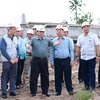The Central Highlands province of Dak Nong needs to utilise its potential in land forestry and mining to develop industrial crops and high-technology agriculture.
Party General Secretary Nguyen Phu Trong made the instruction at his meeting with key officials from Dak Nong province on December 8 during his fact-finding tour to the Central Highlands.
Trong affirmed the province’s important role and position in socio-economy, security-defence and foreign affairs. He hailed the local Party committee, authorities and people for obtaining significant socio-economic development results this year.
Despite economic difficulties, exports are estimated to increase 38 percent over the previous year and budget collection by 22 percent. The poverty rate is estimated to fall by 3 percent to 23.8 percent of the total number of households. Living standards, education, health services and infrastructure have all improved.
Dak Nong should promote the rural area-building movement and implement sustainable poverty reduction programmes, while strengthening land and forestry management, protection and exploitation, the Party leader stressed.
At the meeting, he also urged Dak Nong to improve resettlement for local people, including unplanned migrants.
Sharing the difficulties experienced in the implementation of Nhan Co Aluminium Plant, Trong stressed the need to carry out the project for its potential benefit to Dak Nong.
Earlier, he visited Tuy Duc district’s Quang Tam commune, an especially challenging area with over 40 percent of the local population living under the poverty line.
He presented gifts to State-policy beneficiary families in Quang Tam commune.
Separated from Dak Lak in 2004, Dak Nong has an area of 650,000 hectares and a population of 520,000 from 40 ethnic groups. The province is endowed with natural resources like bauxite, and has cool and favourable weather conditions for the development of industrial crops including coffee, rubber, cashew nuts and pepper. It is also at an advantage in hydro-power and tourism development.
However, forest management and protection is poor. The forest area and its quality are decreasing. In 2012, 190 hectares of woodland was illegally destroyed.-VNA
Party General Secretary Nguyen Phu Trong made the instruction at his meeting with key officials from Dak Nong province on December 8 during his fact-finding tour to the Central Highlands.
Trong affirmed the province’s important role and position in socio-economy, security-defence and foreign affairs. He hailed the local Party committee, authorities and people for obtaining significant socio-economic development results this year.
Despite economic difficulties, exports are estimated to increase 38 percent over the previous year and budget collection by 22 percent. The poverty rate is estimated to fall by 3 percent to 23.8 percent of the total number of households. Living standards, education, health services and infrastructure have all improved.
Dak Nong should promote the rural area-building movement and implement sustainable poverty reduction programmes, while strengthening land and forestry management, protection and exploitation, the Party leader stressed.
At the meeting, he also urged Dak Nong to improve resettlement for local people, including unplanned migrants.
Sharing the difficulties experienced in the implementation of Nhan Co Aluminium Plant, Trong stressed the need to carry out the project for its potential benefit to Dak Nong.
Earlier, he visited Tuy Duc district’s Quang Tam commune, an especially challenging area with over 40 percent of the local population living under the poverty line.
He presented gifts to State-policy beneficiary families in Quang Tam commune.
Separated from Dak Lak in 2004, Dak Nong has an area of 650,000 hectares and a population of 520,000 from 40 ethnic groups. The province is endowed with natural resources like bauxite, and has cool and favourable weather conditions for the development of industrial crops including coffee, rubber, cashew nuts and pepper. It is also at an advantage in hydro-power and tourism development.
However, forest management and protection is poor. The forest area and its quality are decreasing. In 2012, 190 hectares of woodland was illegally destroyed.-VNA



















